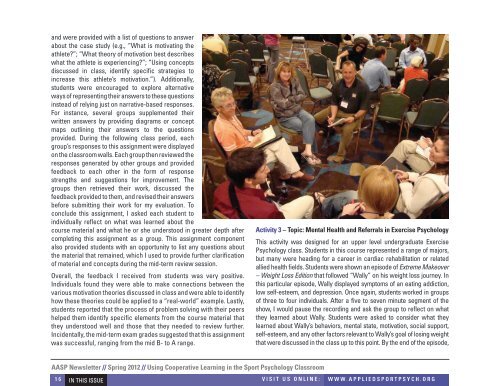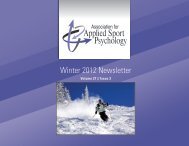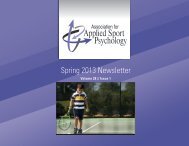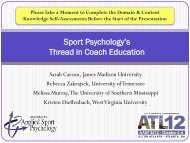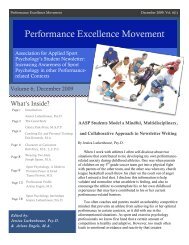Spring 2012 Newsletter - Association for Applied Sport Psychology
Spring 2012 Newsletter - Association for Applied Sport Psychology
Spring 2012 Newsletter - Association for Applied Sport Psychology
Create successful ePaper yourself
Turn your PDF publications into a flip-book with our unique Google optimized e-Paper software.
and were provided with a list of questions to answer<br />
about the case study (e.g., “What is motivating the<br />
athlete”; “What theory of motivation best describes<br />
what the athlete is experiencing”; “Using concepts<br />
discussed in class, identify specific strategies to<br />
increase this athlete’s motivation.”). Additionally,<br />
students were encouraged to explore alternative<br />
ways of representing their answers to these questions<br />
instead of relying just on narrative-based responses.<br />
For instance, several groups supplemented their<br />
written answers by providing diagrams or concept<br />
maps outlining their answers to the questions<br />
provided. During the following class period, each<br />
group’s responses to this assignment were displayed<br />
on the classroom walls. Each group then reviewed the<br />
responses generated by other groups and provided<br />
feedback to each other in the <strong>for</strong>m of response<br />
strengths and suggestions <strong>for</strong> improvement. The<br />
groups then retrieved their work, discussed the<br />
feedback provided to them, and revised their answers<br />
be<strong>for</strong>e submitting their work <strong>for</strong> my evaluation. To<br />
conclude this assignment, I asked each student to<br />
individually reflect on what was learned about the<br />
course material and what he or she understood in greater depth after<br />
completing this assignment as a group. This assignment component<br />
also provided students with an opportunity to list any questions about<br />
the material that remained, which I used to provide further clarification<br />
of material and concepts during the mid-term review session.<br />
Overall, the feedback I received from students was very positive.<br />
Individuals found they were able to make connections between the<br />
various motivation theories discussed in class and were able to identify<br />
how these theories could be applied to a “real-world” example. Lastly,<br />
students reported that the process of problem solving with their peers<br />
helped them identify specific elements from the course material that<br />
they understood well and those that they needed to review further.<br />
Incidentally, the mid-term exam grades suggested that this assignment<br />
was successful, ranging from the mid B- to A range.<br />
Activity 3 – Topic: Mental Health and Referrals in Exercise <strong>Psychology</strong><br />
This activity was designed <strong>for</strong> an upper level undergraduate Exercise<br />
<strong>Psychology</strong> class. Students in this course represented a range of majors,<br />
but many were heading <strong>for</strong> a career in cardiac rehabilitation or related<br />
allied health fields. Students were shown an episode of Extreme Makeover<br />
– Weight Loss Edition that followed “Wally” on his weight loss journey. In<br />
this particular episode, Wally displayed symptoms of an eating addiction,<br />
low self-esteem, and depression. Once again, students worked in groups<br />
of three to four individuals. After a five to seven minute segment of the<br />
show, I would pause the recording and ask the group to reflect on what<br />
they learned about Wally. Students were asked to consider what they<br />
learned about Wally’s behaviors, mental state, motivation, social support,<br />
self-esteem, and any other factors relevant to Wally’s goal of losing weight<br />
that were discussed in the class up to this point. By the end of the episode,<br />
AASP <strong>Newsletter</strong> // <strong>Spring</strong> <strong>2012</strong> // Using Cooperative Learning in the <strong>Sport</strong> <strong>Psychology</strong> Classroom<br />
16 In This Issue<br />
Visit us Online:<br />
www.appliedsportpsych.org


